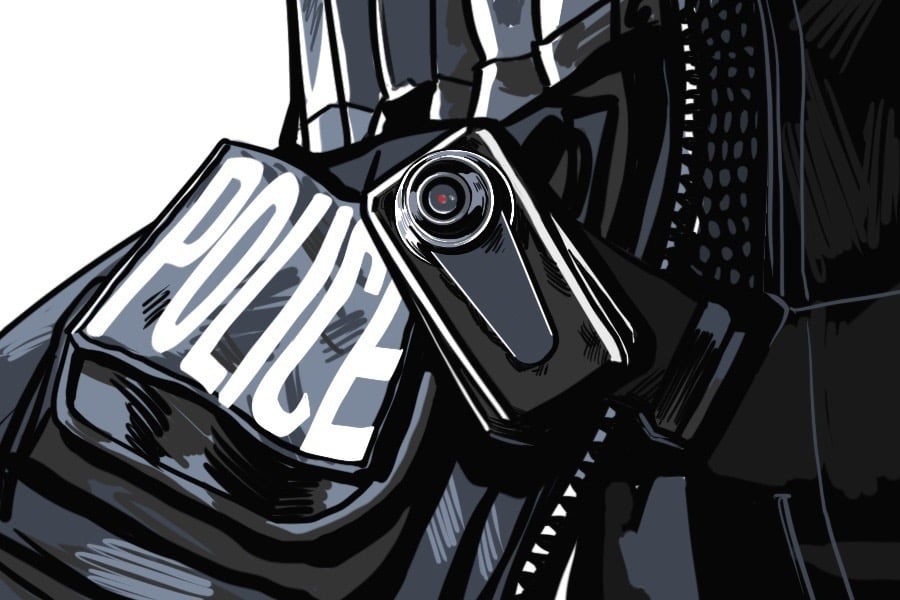Newly-implemented state bill will require body-worn cameras for all police officers
By 2025, all law enforcement officials must wear police body cameras while on duty. Cameras must be turned on at all times, equipped to record 30 seconds before activation, and capable of recording for 10 hours.
January 21, 2022
Illinois is now one of seven states to require police officers to wear body cameras, small video and audio recording devices typically attached to an officer’s uniform.
HB 3653, also known as The SAFE-T Act, requires officers to keep their cameras on while on duty or engaged in “any law enforcement-related encounter or activity.” The act, signed into law February 2021, will require body cameras for municipalities of over 500,000 people starting on Jan. 1 and extend to smaller cities in 2025. The legislation was part of an omnibus effort of the Illinois Black Caucus to counter systemic racism.
State Rep. Marcus Evans (D-Chicago) is one of the bill’s co-sponsors. He said more states should also pass similar legislation.
“We know this is the way of the future, don’t fight it. Let’s keep our law enforcement very open so that we can build trust,” Evans said.
Officer-worn body cameras allow police to collect evidence, gather information for training and provide impartial documentation to settle allegations of officer misconduct, according to the bill’s text.
The bill mandates that all recordings must be kept for 90 days, after which they will be destroyed. The supervisor of the recording officer may access the recording to complete incident reports, however, officers will not have access to their own body camera footage.
State House Republicans took issue with the bill being passed in a lame-duck session. House Republicans filed HB 4499 on Jan. 13 in an attempt to repeal the SAFE-T act. Rep. Patrick Windhorst (R-Metropolis) filed the “anti-police reforms” bill and eight Republicans co-sponsored.
“This is one step Illinois can take to restore law and order and stem the tide of spiraling crime,” Windhorst said in a statement on his website.
The statewide mandate goes into effect in 2024 for Evanston, a municipality under 100,000. But Evanston Police Department instituted a body camera pilot program in 2017 and City Council granted the department $1.1 million to expand body-worn camera usage to all EPD officers in 2018 following the pilot’s success.
“Having body-worn cameras is a best practice is a commitment to transparency,” Evanston Police Cmdr. Ryan Glew said. “I think it gives officers and citizens a peace of mind to know that the body-worn cameras are deployed and the interactions are being recorded.”
Other benefits from EPD’s body-worn camera program include their evidentiary footage,which can be used in court proceedings, as well as their ability to compensate for the failings of the human memory and the helpfulness in dispute and complaint resolution, Glew said.
A July 2021 Daily investigation found EPD withheld body camera footage from a resident following an incident in which police may have pointed guns toward her kids.
Kenny Winslow, chief of police in Springfield, Ill. and deputy director at The Illinois Association of Police Chiefs said about half of his officers were hesitant to use body-worn cameras at first. But officers now tell him they don’t want to go on duty without their cameras.
“We see how the cameras work, how they help with transparency, how they help with complaint resolution, how they help with evidence, how they help with improving case support,” Winslow said. “They also hold us accountable out there, making sure that our officers are doing what we want them to do.
One major drawback of the body camera mandate is the cost. Ed Wojcicki, ILAPC’s executive director, said the three major costs include the cameras themselves, storage of footage and the personnel time to review footage and Freedom of Information Act requests.
A June 2021 article from the American Civil Liberties Union raised the concern that body cameras will invade resident privacy. A 2016 study from the Center for Evidence-Based Crime Policy at George Mason University found 92.6% of recorded evidence from body-worn cameras was used to prosecute private citizens.
Northwestern linguistics and computer science Prof. Rob Voigt studies body camera footage to measure linguistic differences that show racial disparities in police respectfulness during traffic stops. He said this law can be effective in reducing these racial disparities in police treatment as long as departments make body camera footage accessible to researchers and oversight agencies.
State Rep. Camille Lilly (D-Oak Park) emphasized the importance of the body camera requirement for Illinois.
“Body cameras will allow all of us to have the information and conversations that allow us to be a better society,” Lilly said.
Email: isabellebutera2025@u.northwestern.edu
Twitter: @isabelle_butera
Related Stories:
— Daniel Biss discusses policing, racial equity and town-gown relations in Northwestern forum
— Mayor holds Q&A on alternatives to policing in Evanston
— Evanston residents discussed alternatives to policing in CNP meeting



